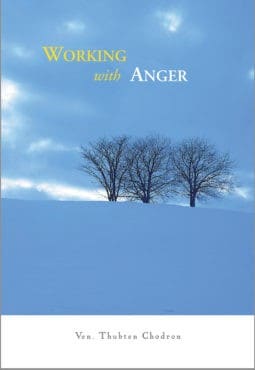
Working with Anger
Free Distribution VersionA short, freely distributed booklet, subsequently expanded into a full length book. This text starts us on the path to transforming anger into a peaceful, patient, kind mind and heart.
Download
Copyright © 2000-2020 by Thubten Chodron. Strictly for free distribution and not to be sold.
About the book
Transcribed from teachings by Venerable Chodron, this freely distributed book presents the techniques the Buddha prescribed for overcoming anger. Whether we call it irritation, annoyance, aversion, rage or some other term, anger harms ourselves and others. Presented in a common sense manner, this short text cuts to the heart of ways to look at our minds, deal with this explosive volcano called anger, and cultivate patience as an antidote.
For the expanded, full-length book on this topic, see Working with Anger.
Questions addressed
- Is anger destructive?
- Is it good to let our anger out?
- What can we do when we are angry?
- How can we avoid anger and cultivate patience?
- How can we accept criticism without anger arising?
- Is there an antidote to anger?
- What are the techniques to help to dissolve our anger?
Excerpt
Many therapists encourage their clients to feel angry about things that happened years ago and to let their anger out. Later, when the therapists or clients listen to Buddhist teachings on the disadvantages of anger, they wonder if the Buddha advocated suppressing anger.
No, he didn’t. Suppressing or repressing anger doesn’t get rid of it, it only hides it. We may have a smile on our face, but if we’re still angry in our hearts, we haven’t resolved the anger. That’s not practising patience, it’s being a hypocrite! In addition, holding the anger is painful and can harm us.
It’s important to be honest with ourselves and to recognise our anger, rather than to pretend it doesn’t exist. However, recognising we’re angry is different from verbally and physically expressing it. When we let our anger out, we risk making other people miserable. Nor does releasing the anger by beating pillows or screaming in solitude resolve the hostility or frustration. That merely dissipates the anger energy temporarily. In addition, we start to form a habit of screaming or beating things, which isn’t beneficial.
There are alternatives to the extremes of either suppressing the anger or letting it out. Buddhism advocates dissolving it, so that it no longer exists. Then our hearts will be free from hostility and our actions won’t threaten others’ wellbeing. With clear minds, we can then discuss and resolve difficult situations with others.
